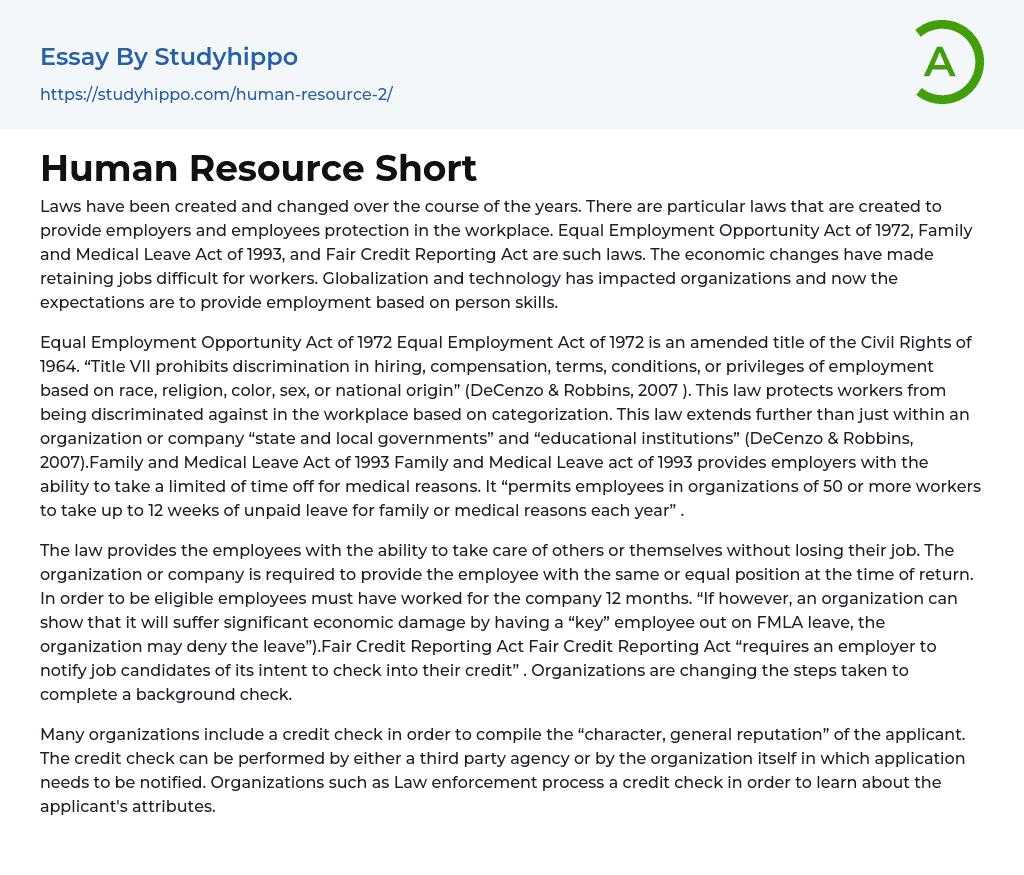Throughout time, various laws have been created and modified to guarantee the safety of workplaces. Some examples of these laws are the Equal Employment Opportunity Act of 1972, the Family and Medical Leave Act of 1993, and the Fair Credit Reporting Act. The main purpose of these laws is to provide employers and employees with particular protections.
Due to globalization and technology, workers are confronted with difficulties in maintaining employment. Consequently, organizations must offer job opportunities that align with individuals' distinct skill sets. The Equal Employment Opportunity Act of 1972, which is an extension of the Civil Rights Act of 1964, prohibits discrimination in hiring, compensation, terms and conditions of employment, as well as privileges based on race, religion, color, sex, or national origin.
The Family and Medical Leave Act of 1993, also known as FMLA, safe
...guards employees from discrimination at work due to categorization. It encompasses not only organizations or companies but extends its coverage to state and local governments as well as educational institutions (DeCenzo & Robbins, 2007). This act empowers employers to provide a designated time off for medical reasons, allowing employees in establishments with over 50 staff members the opportunity to take up to 12 weeks of unpaid leave annually for family or medical purposes. By doing so, this law guarantees that employees can attend to their personal needs or those of others without jeopardizing their employment status.
The organization or company must guarantee the employee a comparable position upon their return, as long as the employee has been with the company for at least 12 months. However, if the organization can demonstrate that granting FMLA leave to a "key" employee would result in
significant economic harm, they have the right to deny such leave. As per the Fair Credit Reporting Act, employers are obligated to notify job applicants about their intention to conduct a credit check. Many organizations are adapting their background check protocols by incorporating credit checks to evaluate an applicant's integrity and overall reputation.
The credit check for an application can be done by either a third party agency or by the organization itself that needs to be informed. Organizations, like law enforcement, conduct credit checks to gather information about the applicant's characteristics.
- Profession essays
- Labour Economics essays
- Occupational Safety And Health essays
- Pension essays
- Salary essays
- Strike Action essays
- Wage essays
- Career essays
- Workplace essays
- Homeless essays
- Working Together essays
- Career Path essays
- Hunter essays
- Farmer essays
- Nurse essays
- Pilot essays
- Professionalism essays
- Doctor essays
- Discipline essays
- Police Officer essays
- Labor essays
- Social Work essays
- Model essays
- Architect essays
- Engineer essays
- Administration essays
- Stakeholders essays
- Teamwork essays
- Caregiver essays
- Public Administration essays
- Raising Minimum Wage essays
- Interview essays
- Job Interview essays
- Career Choice essays
- Career Goals essays
- Portfolio essays
- Community Service essays
- Work-Life Balance essays
- Performance Appraisal essays
- Job essays
- Employee essays
- Skills essays
- Service essays
- Vocation essays
- Internship essays
- Work Experience essays
- Duty essays
- Dream Job essays
- Career Plan essays
- Working Time essays




